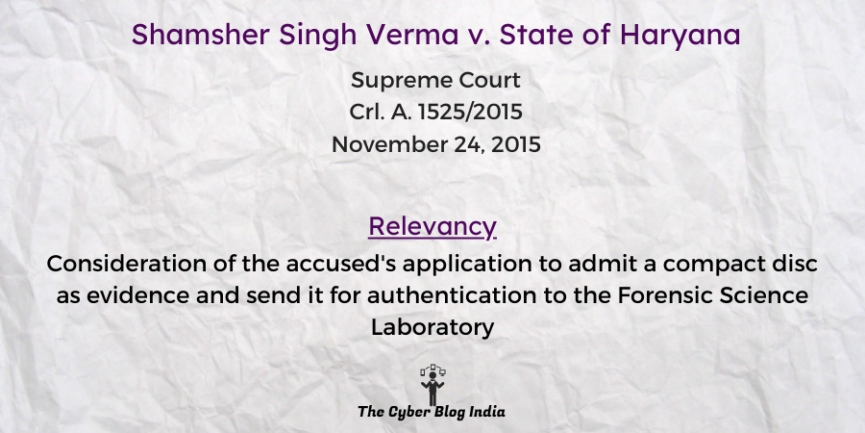Shamsher Singh Verma v. State of Haryana

Shamsher Singh Verma v. State of Haryana
In the Supreme Court of India
Crl. A. 1525/2015
Before Justice Dipak Misra and Justice Prafulla C. Pant
Decided on November 24, 2015
Relevancy of the case: Consideration of the accused’s application to admit a compact disc as evidence and send for authentication to the Forensic Science Laboratory
Statutes and Provisions Involved
- The Indian Penal Code, 1860 (Section 354, 376)
- The Code of Criminal Procedure, 1973 (Section 294, 313)
- The Indian Evidence Act, 1872 (Section 3, 104)
- The Protection of Children from Sexual Offences Act, 2015 (Section 4, 12)
Relevant Facts of the Case
- The police illegally detained the appellant, the complainant’s brother, at the complainant’s instance to settle a property dispute with him and his brother.
- The complainant lodged an FIR alleging that the appellant molested his niece.
- Subsequently, the authorities framed charges against the appellant for outraging the modesty of a woman and sexually harassing a child under the abovementioned provisions.
- The Sessions Court rejected the appellant’s application to exhibit a compact disc (CD) as evidence, and the High Court affirmed this decision. According to the appellant, this CD contains a recorded conversation between the victim’s father, his son, and his wife regarding a property dispute.
- Consequently, the appellant has approached the Supreme Court against the High Court’s order.
Prominent Arguments by the Advocates
- The appellant’s counsel argued that the accused has the right to present evidence in their defence. The lower courts erred by denying him this right.
- The complainant’s counsel appellant’s the alleged conversation between the victim’s father and the appellant’s son and wife occurred after the incident of molestation and rape. Therefore, the trial court correctly rejected the appellant’s application.
Opinion of the Bench
- A tape-recorded conversation is admissible, provided it is relevant to the issues and the voice is identified. Further, eliminating the possibility of tampering will prove the accuracy of the tape-recorded conversation.
- The courts erred in law by rejecting the application to play the compact disc. This would have allowed the public prosecutor to admit or deny its contents and permitted the defence to send it to the Forensic Science Laboratory.
- A compact disk is a document under Section 3 of the Evidence Act.
Final Decision
- The court allowed the appeal.
Gouri Shrivastava, an undergraduate student at NMIMS School of Law, Navi Mumbai, has contributed this case summary to our repository.
